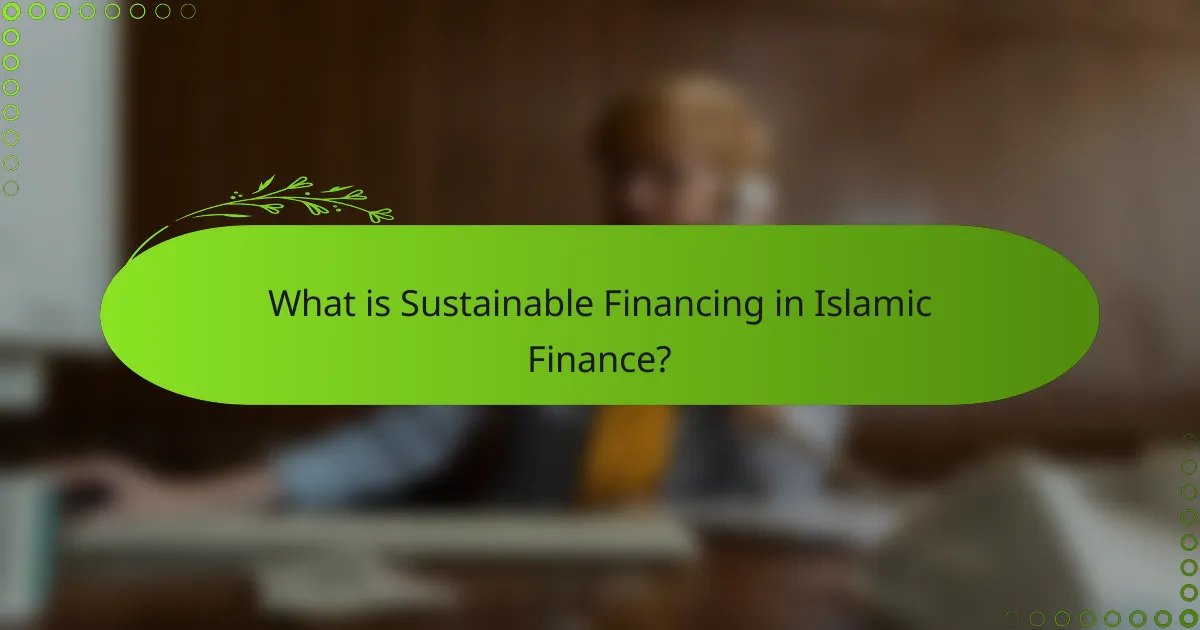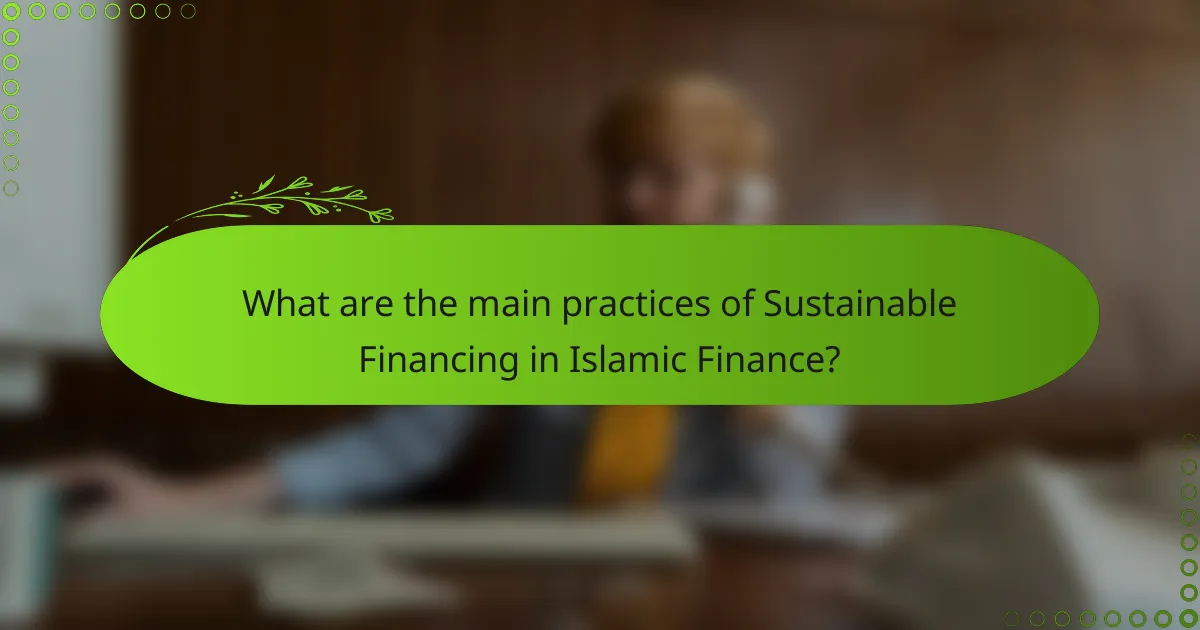
What is Sustainable Financing in Islamic Finance?
Sustainable financing in Islamic finance refers to financial practices that align with Islamic law while promoting social and environmental responsibility. This approach integrates ethical considerations into financial decision-making. It emphasizes investments that contribute to sustainable development. Sustainable financing avoids activities deemed harmful, such as those involving excessive speculation or unethical practices. The principles of Islamic finance, such as risk-sharing and prohibition of interest, support sustainable financing. This framework encourages investments in sectors like renewable energy and social infrastructure. Research indicates that sustainable financing can enhance economic stability while adhering to Islamic values.
How does Sustainable Financing align with Islamic principles?
Sustainable financing aligns with Islamic principles by promoting ethical investments and social responsibility. Islamic finance prohibits investments in harmful industries, such as alcohol and gambling. This aligns with sustainable financing’s focus on environmental and social governance. Both frameworks emphasize risk-sharing and equitable distribution of wealth. Sustainable financing supports projects that benefit society and the environment, reflecting the Islamic principle of promoting communal welfare. Additionally, Islamic finance encourages transparency and accountability in financial dealings. This further enhances the alignment with sustainable financing, which advocates for ethical practices in investment and lending.
What are the key tenets of Islamic finance that support sustainability?
The key tenets of Islamic finance that support sustainability include the prohibition of riba (interest), the emphasis on risk-sharing, and the promotion of ethical investments. Riba is forbidden as it is seen as exploitative and promotes inequality. This principle encourages fair financial practices that benefit all parties involved. Risk-sharing fosters partnerships that align interests and promote sustainable economic growth. Ethical investments are mandated, ensuring that funds are directed towards socially responsible and environmentally friendly projects. These tenets collectively aim to create a just and sustainable financial system that benefits society at large.
How do these principles influence financial decision-making?
The principles of sustainable financing in Islamic finance significantly influence financial decision-making. These principles emphasize ethical investment and social responsibility. They guide individuals and institutions to prioritize investments that align with Islamic values. This includes avoiding industries such as alcohol, gambling, and interest-based financing. The focus on risk-sharing rather than risk-transfer encourages more equitable financial practices. Additionally, adherence to environmental and social governance standards is integral. Research shows that ethical investments often yield comparable or superior returns over time. Therefore, these principles shape a more responsible and sustainable financial landscape.
Why is Sustainable Financing important in today’s financial landscape?
Sustainable financing is crucial in today’s financial landscape as it promotes investments that have positive environmental and social impacts. This approach addresses global challenges like climate change and social inequality. According to the Global Sustainable Investment Alliance, sustainable investment reached $30.7 trillion in 2018, reflecting a growing trend among investors. It encourages businesses to adopt responsible practices, enhancing their long-term viability. Additionally, sustainable financing aligns with regulatory trends, such as the European Union’s Green Deal, which aims to make Europe climate-neutral by 2050. This alignment mitigates risks associated with climate-related regulations and shifts in consumer preferences. Overall, sustainable financing fosters economic resilience while supporting sustainable development goals.
What challenges does the global economy face that Sustainable Financing addresses?
Sustainable financing addresses several challenges faced by the global economy. These challenges include climate change, which threatens ecosystems and economies worldwide. Unsustainable practices lead to resource depletion, impacting future generations. Social inequality is another challenge, as many communities lack access to essential services and economic opportunities. Sustainable financing promotes investments in projects that foster social equity and environmental protection. Additionally, economic instability can arise from unsustainable debt practices. By encouraging responsible lending and investment, sustainable financing mitigates these risks. The global economy, therefore, benefits from sustainable financing through enhanced resilience and long-term growth.
How does Sustainable Financing contribute to social and environmental goals?
Sustainable financing contributes to social and environmental goals by directing funds towards projects that promote sustainability. It supports renewable energy initiatives, which reduce carbon emissions. Sustainable financing also encourages the development of affordable housing, improving social equity. Investments in sustainable agriculture enhance food security and environmental health. According to the Global Sustainable Investment Alliance, sustainable investments reached $35.3 trillion in 2020, indicating significant growth. This trend reflects a growing recognition of the importance of aligning financial practices with social and environmental outcomes. By prioritizing projects that meet these criteria, sustainable financing fosters a more equitable and environmentally responsible economy.

What are the main practices of Sustainable Financing in Islamic Finance?
The main practices of Sustainable Financing in Islamic Finance include risk-sharing, ethical investment, and asset-backed financing. Risk-sharing ensures that both lenders and borrowers share the risks and rewards of an investment. This is fundamental to Islamic finance, as it aligns with the principles of justice and fairness. Ethical investment prohibits funding activities that are harmful to society or the environment. Investments must comply with Shariah law, which emphasizes social responsibility. Asset-backed financing requires that financial transactions be linked to tangible assets. This practice prevents speculation and promotes stability in financial markets. Together, these practices contribute to a sustainable economic environment that is consistent with Islamic values.
How do financial products in Islamic finance promote sustainability?
Financial products in Islamic finance promote sustainability by adhering to ethical investment principles. These products avoid financing activities that harm society or the environment. They prioritize investments in sectors that contribute positively to economic development and environmental stewardship. For instance, Islamic finance supports renewable energy projects and sustainable agriculture. The prohibition of interest (riba) encourages risk-sharing and equitable profit distribution. This structure fosters responsible financial practices. Furthermore, Islamic finance emphasizes social justice and community welfare. By aligning financial activities with ethical values, Islamic finance promotes long-term sustainability in economic systems.
What types of investment vehicles are used in Sustainable Financing?
Investment vehicles used in Sustainable Financing include green bonds, sustainable mutual funds, and impact investing funds. Green bonds finance projects with environmental benefits. Sustainable mutual funds invest in companies with strong environmental, social, and governance (ESG) practices. Impact investing funds aim to generate social and environmental impact alongside financial returns. These vehicles promote sustainability while offering potential financial gains. The use of these investment vehicles has increased, with green bond issuance reaching $269.5 billion in 2020, highlighting their growing importance in financing sustainable projects.
How are risk-sharing mechanisms applied in these financial products?
Risk-sharing mechanisms in Islamic finance products are applied through profit and loss sharing arrangements. These mechanisms ensure that both the lender and borrower share the risks associated with financial transactions. Common structures include Mudarabah and Musharakah.
In Mudarabah, one party provides capital while the other offers expertise. Profits are shared according to a pre-agreed ratio, while losses are borne by the capital provider. In Musharakah, all parties contribute capital and share profits and losses in proportion to their investment.
These methods promote equity and fairness, aligning with Islamic principles. They also enhance financial stability by discouraging excessive risk-taking. Islamic finance products thus foster a collaborative approach to risk management, reinforcing ethical financial practices.
What role do institutions play in promoting Sustainable Financing?
Institutions play a crucial role in promoting sustainable financing. They establish frameworks and guidelines that encourage environmentally and socially responsible investments. Institutions, such as banks and financial regulators, integrate sustainability criteria into their lending and investment processes. They provide financial products that support green projects and sustainable businesses. Additionally, institutions engage in capacity-building initiatives to educate stakeholders about sustainable practices. They also facilitate partnerships between public and private sectors to enhance resource mobilization for sustainability. Evidence shows that institutions adopting sustainable financing principles can drive significant capital towards sustainable development goals. For instance, the Global Sustainable Investment Alliance reported a 34% increase in sustainable investment assets from 2016 to 2018, highlighting the impact of institutional efforts.
How do Islamic banks implement Sustainable Financing practices?
Islamic banks implement Sustainable Financing practices by adhering to Shariah principles that promote ethical investments. They focus on financing projects that are environmentally sustainable and socially responsible. Islamic banks avoid investments in industries that are harmful to society, such as alcohol, gambling, and pork. They utilize profit-sharing models like Mudarabah and Musharakah, which align the interests of investors and entrepreneurs. These models encourage responsible business practices and sustainable growth. Additionally, Islamic banks often engage in Green Sukuk, which are bonds specifically for funding environmentally friendly projects. This approach supports renewable energy and sustainable infrastructure development. Islamic banks also ensure compliance with international sustainability standards, enhancing their credibility and market reach.
What partnerships are essential for fostering sustainability in finance?
Collaborations between financial institutions, governments, and non-governmental organizations (NGOs) are essential for fostering sustainability in finance. Financial institutions provide the necessary capital and expertise. Governments create regulatory frameworks that support sustainable practices. NGOs advocate for environmental and social responsibility, influencing both policy and investment decisions.
These partnerships can lead to innovative financial products, like green bonds, which fund sustainable projects. Research from the Global Sustainable Investment Alliance indicates that sustainable investments reached $30.7 trillion globally in 2020, highlighting the impact of these collaborations.
Furthermore, partnerships that include technology firms can enhance transparency and efficiency in sustainable finance. For example, blockchain technology can track the impact of investments. This synergy among diverse entities is crucial for achieving long-term sustainability goals in the finance sector.

What are the ethical implications of Sustainable Financing in Islamic Finance?
Sustainable financing in Islamic finance emphasizes ethical investment practices aligned with Sharia principles. It seeks to promote social welfare and environmental sustainability. Investments must avoid sectors that harm society, such as alcohol, gambling, and usury. This aligns with the Islamic principle of avoiding harm and promoting good. Ethical implications also include ensuring transparency and fairness in financial transactions. Islamic finance promotes risk-sharing rather than risk transfer, fostering a cooperative economic environment. Additionally, it encourages responsible stewardship of resources, reflecting the Islamic value of sustainability. Overall, sustainable financing in Islamic finance reinforces ethical responsibility towards society and the environment.
How does Sustainable Financing reflect ethical investment principles?
Sustainable financing reflects ethical investment principles by prioritizing social and environmental responsibility. It aligns financial practices with ethical standards that promote sustainability. Investments focus on projects that have positive impacts on society and the environment. This approach often avoids industries that harm these areas, such as fossil fuels or tobacco.
According to the Global Sustainable Investment Alliance, sustainable investment assets reached $30.7 trillion globally in 2018. This growth indicates a strong shift toward ethical considerations in finance. Sustainable financing also incorporates transparency and accountability, ensuring that funds are used responsibly. By adhering to these principles, it fosters trust among investors and stakeholders.
What criteria are used to evaluate ethical investments in Islamic finance?
Ethical investments in Islamic finance are evaluated based on Shariah compliance, social impact, and financial performance. Shariah compliance ensures that investments do not involve prohibited activities such as gambling or alcohol. Social impact assesses the positive contributions of investments to society, including community welfare and environmental sustainability. Financial performance evaluates the return on investment while adhering to ethical standards. These criteria align with the principles of Islamic finance, promoting ethical and responsible investing.
How does transparency impact trust in Sustainable Financing practices?
Transparency significantly enhances trust in Sustainable Financing practices. Clear communication of financial practices builds stakeholder confidence. When organizations disclose their methodologies, stakeholders can assess alignment with sustainability goals. This openness reduces the likelihood of misinformation. Research indicates that 78% of investors prioritize transparency in sustainable investments. Trust fosters long-term relationships between financiers and stakeholders. Enhanced trust can lead to increased investment and participation in sustainable projects. Therefore, transparency is crucial in establishing credibility in Sustainable Financing.
What are the potential criticisms of Sustainable Financing in Islamic Finance?
Potential criticisms of Sustainable Financing in Islamic Finance include concerns about compliance with Shariah principles. Critics argue that some sustainable projects may conflict with Islamic prohibitions, such as investments in alcohol or gambling. There is also skepticism regarding the transparency of ethical claims made by financial institutions. Some argue that greenwashing can occur, where institutions may misrepresent the sustainability of their investments. Additionally, the complexity of Islamic finance structures can lead to misunderstandings about their sustainability impacts. Critics highlight the lack of standardized metrics for measuring sustainability in Islamic finance. This inconsistency can hinder effective evaluation and comparison of sustainable financing options. Overall, these criticisms raise questions about the alignment of Islamic finance with sustainable development goals.
How can these criticisms be addressed to strengthen the framework?
Criticisms of sustainable financing in Islamic finance can be addressed by enhancing transparency and accountability. Increasing transparency in financial reporting allows stakeholders to understand the ethical implications of investments. Implementing rigorous standards for sustainability assessment can improve credibility. Engaging with diverse stakeholders can provide insights and foster collaboration. Regular audits and evaluations can ensure compliance with Islamic principles. Education and training for financial practitioners can promote a deeper understanding of sustainability. These measures collectively strengthen the framework by aligning practices with ethical and sustainable goals.
What lessons can be learned from past experiences in Islamic finance?
Lessons from past experiences in Islamic finance include the importance of adhering to Sharia principles. Compliance with ethical standards fosters trust among stakeholders. Historical challenges, such as lack of standardization, highlight the need for clear regulations. The 2008 financial crisis underscored the resilience of Islamic finance due to its asset-backed nature. Additionally, successful models demonstrate the value of risk-sharing mechanisms. Learning from these experiences can enhance future practices in sustainable financing. Overall, past experiences inform better governance and operational frameworks in Islamic finance.
What best practices can enhance Sustainable Financing in Islamic Finance?
Best practices that can enhance Sustainable Financing in Islamic Finance include the integration of environmental, social, and governance (ESG) criteria into investment decisions. This approach aligns with Islamic principles that promote ethical investments. Additionally, establishing clear frameworks for green Sukuk can facilitate financing for sustainable projects. Transparency in reporting and adherence to Shariah compliance are essential for building trust among stakeholders. Engaging with local communities ensures that projects address their needs and contribute to social welfare. Collaboration among financial institutions can lead to shared best practices and innovation in sustainable financing solutions. These practices collectively support the growth of a robust sustainable financing ecosystem within Islamic Finance.
Sustainable financing in Islamic finance is the primary entity discussed, characterized by financial practices that align with Islamic law while promoting social and environmental responsibility. The article outlines how sustainable financing integrates ethical considerations into investment decisions, emphasizing risk-sharing, prohibition of interest, and support for socially responsible projects. Key tenets of Islamic finance that support sustainability are highlighted, alongside the importance of transparency and accountability. Additionally, the article addresses the challenges faced by the global economy, the role of institutions, and the ethical implications of sustainable financing practices, providing a comprehensive overview of best practices and potential criticisms within this framework.